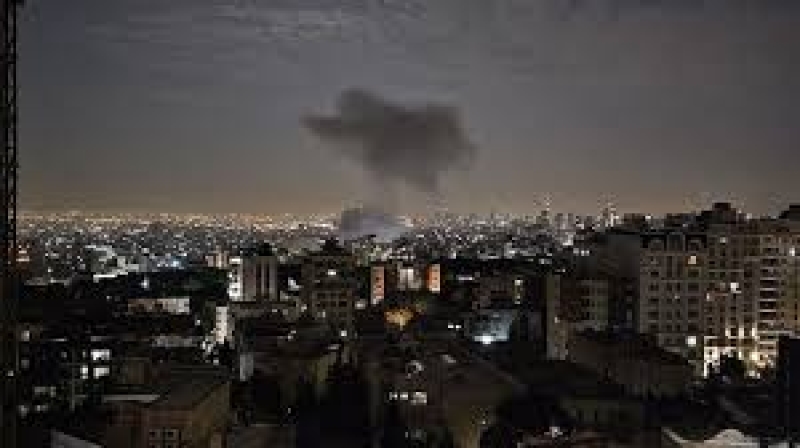- Puppet show enchants Children as Boi Mela comes alive on day 2 |
- DSCC Admin Salam’s drive to make South Dhaka a ‘clean city’ |
- 274 Taliban Dead, 55 Pakistan Troops Killed |
- Now 'open war' with Afghanistan after latest strikes |
- Dhaka's air quality fourth worst in world on Friday morning |
Iran Calls Israeli Strikes a 'Declaration of War'

Iran on Friday branded Israel’s massive wave of airstrikes as a "declaration of war," as U.S. President Donald Trump warned Tehran of "even more brutal" consequences if it refuses to negotiate on its nuclear program.
The Israeli military claimed its strikes had killed most of the senior leadership of Iran’s Revolutionary Guards’ air force and hit approximately 100 targets, including nuclear facilities. Prime Minister Benjamin Netanyahu said Israel had struck at the "heart" of Iran’s nuclear program and vowed to continue operations "for as many days as it takes."
Iran’s supreme leader Ayatollah Ali Khamenei condemned the attack, warning Israel of a “bitter and painful” response. Foreign Minister Abbas Araghchi echoed the sentiment, calling the strikes an unequivocal "declaration of war."
Among those killed were top Iranian military figures, including Armed Forces Chief of Staff Mohammad Bagheri and Revolutionary Guards commander Hossein Salami, according to Iranian state media. A senior adviser to Khamenei was reported wounded. Khamenei swiftly appointed replacements, signaling Tehran’s intent to maintain command continuity.
In a statement, Israel said its strikes targeted an underground command center where Guards air force leaders had gathered to plan a major offensive. “Those who work toward Israel's destruction will be eliminated,” said Israeli Defence Minister Israel Katz.
Iran confirmed the death of its aerospace commander and other “brave and dedicated fighters.” The semi-official Tasnim news agency reported that six nuclear scientists were among the dead. Iranian state media also said civilians, including women and children, were killed. Emergency officials reported at least 95 people wounded.
Images from the scene showed a gaping hole in a residential building in Tehran, evidence of a precise and localized strike.
Air traffic at Tehran’s Imam Khomeini International Airport was halted, while Iraq, Jordan, and Syria closed their airspace. Jordan said its military intercepted multiple drones and missiles that had entered its airspace from the direction of Iran.
On the streets of Tehran, fear and anger ran high. “How much longer are we going to live in fear?” asked 62-year-old retiree Ahmad Moadi. “There must be an overwhelming, scathing response.”
Iran’s armed forces accused Israel of crossing “all red lines” and warned that there would be “no limits” in its retaliation.
Meanwhile, President Trump sought to distance the U.S. from Israel’s actions, insisting Washington was not involved. He warned Iran, however, against striking U.S. personnel or assets. “If Iran doesn’t make a deal, the death and destruction will only increase,” he said.
The president also said the U.S. was drawing down its diplomatic presence in the region amid Iranian threats to target American bases. Prior to the Israeli strikes, Trump said a new nuclear deal with Tehran was “fairly close,” though he admitted the attack could “blow it—or help it.”
Secretary of State Marco Rubio reiterated the U.S. position, warning Iran not to target American bases and emphasizing that the U.S. had no role in the Israeli offensive.
The airstrikes have cast doubt over planned U.S.-Iran nuclear talks scheduled for Sunday in Oman. Still, Trump expressed hope that negotiations could continue.
The UN’s International Atomic Energy Agency confirmed that Natanz—Iran’s primary uranium enrichment site—had been among the Israeli targets. The Israeli military claimed to have hit underground centrifuge facilities. Iran's Atomic Energy Organization insisted damage was mostly superficial and said there were “no casualties” at the facility.
Israel has long viewed Iran as an existential threat, a sentiment intensified by the October 7, 2023, Hamas attack—backed by Tehran—that ignited the Gaza war. Since then, Israel and Iran have exchanged direct strikes, a historic escalation in their decades-long shadow conflict.
The IAEA recently accused Iran of failing to meet its nuclear obligations. In response, Iranian nuclear chief Mohammad Eslami slammed the resolution as “extremist,” and announced plans for a new enrichment facility in a more secure location.
Iran currently enriches uranium up to 60% purity—well beyond the 3.67% cap set by the defunct 2015 nuclear deal, but short of the 90% required for a weapon. Israel and Western powers accuse Iran of seeking a nuclear bomb, a charge Tehran denies.
The Israeli assault sent oil prices soaring and markets reeling, heightening fears of a wider regional conflict.

